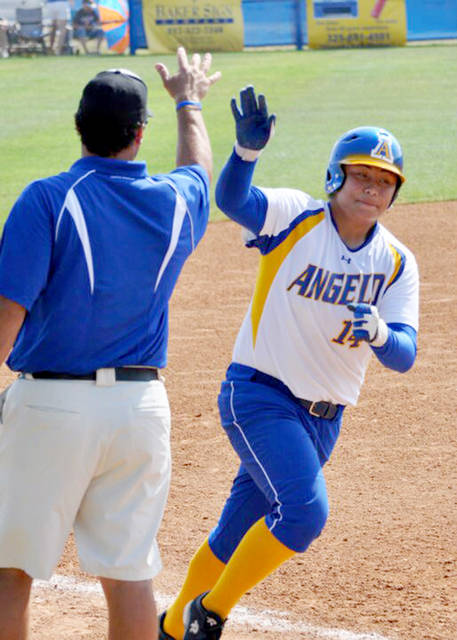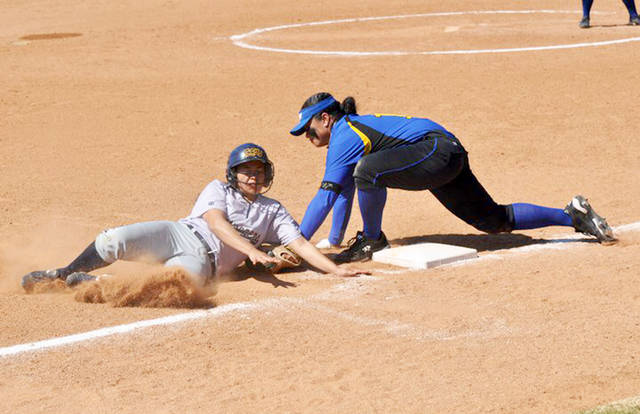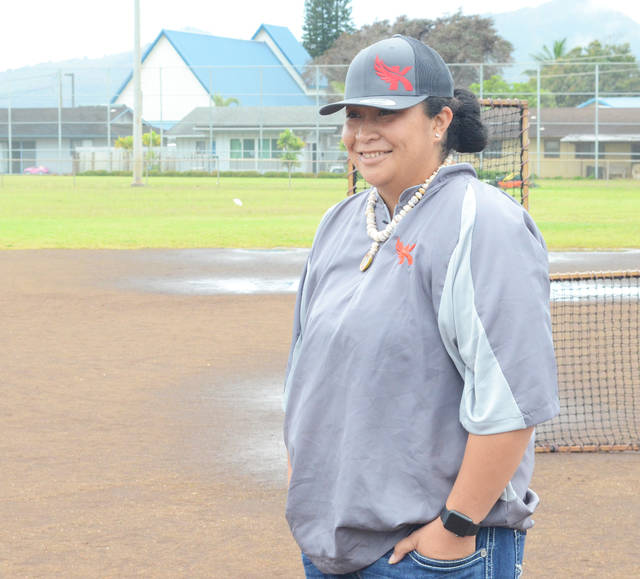Talk Story: Shana Tafiti

Photo courtesy Shana Tafiti
In this 2011 photo, Angelo State University infielder Shana Tafiti gets a high five from a coach as she rounds third after cracking a home run.

Photo courtesy Shana Tafiti
In this 2011 photo, Angelo State University infielder Shana Tafiti applies the tag on an opposing player.

Photo courtesy Shana Tafiti
In this 1994 photo, Shana Tafiti, center, then age 4, stops for a photo with grandparents Joe and Paulette Grace.

Nick Celario / The Garden Island
Kauai High School varsity softball head coach Shana Tafiti talks story on Tuesday at Isenberg Park.
About seven months ago, Shana Tafiti returned home to Kauai.
About seven months ago, Shana Tafiti returned home to Kauai.
The Waimea High School 2008 graduate played collegiate softball at Central Arizona Junior College and then Angelo State University, a NCAA Division II school in Texas.
Tafiti was quite the hitter, though she says she hates hitting.
In 2012, Tafiti led Angelo State’s team in home runs (19), RBIs (76) and slugging percentage (.765), according to Angelo State Athletics. Her 76 RBIs that year set a new school single-season record.
Tafiti also played for USA Baseball. That’s baseball, not softball.
Now, she’s doing her best to share her knowledge of the game as the first-year varsity softball head coach for Kauai High School.
Tafiti sat down with The Garden Island at Isenberg Park, the Red Raiders’ home field, and shared her thoughts on coaching high schoolers and looked back on her time as a player.
I know you graduated from Waimea. Is it weird wearing Kauai High colors?
I played my freshman year for Kauai High, so it’s really not that big of a deal. I played one year for Kauai High, then when we moved to Lawai, I transferred to Waimea.
Have you coached previously?
Yeah. I coached baseball. From (ages) 8 to about 14, I had the same team. I followed that same team. They’re called the Texas Hitmen. Then, I coached at Angelo State. I was like a G.A. (graduate assistant). I stayed for another three years.
Did you always wanted to go into coaching when you were done playing?
No.
No?
I wanted to be an athletic trainer for a long time. When I was in college, I did the athletic trainer thing. I was like, “Nah. This isn’t for me.” So, the coach was like, “Just coach with me for a while. Just stick around. You’ll like it. You’ll see a different aspect of the game, and you’ll fall in love with another aspect of the game.” He said, “When you see the players do something that you taught them, it gives you that feeling like when you hit a home run.” I was like, “Uh, I don’t know, coach.” He said, “Give it a chance. You’d be an amazing coach.”
So, I stayed around for a while. Going to recruit, that was long hours. Sitting at games, like 10 games, just to watch one girl. Recruiting was the worst part of coaching, I think.
Up to this point, what’s some of the rewarding and challenging things coaching the softball team?
Every day watching the girls grow is rewarding in itself — watching them grow and learn the game. Just the fundamentals that we’re missing, that’s kind of hard. We’re doing the same things over and over to teach them the fundamentals. That’s the hard part right now — getting them to understand the fundamentals of the game and situational-wise. It doesn’t come overnight. It takes time. So, just trying to sit and be patient with the girls, I think, is the hardest part.
Me and my coaching staff, we’ve done it forever. So when the girls don’t get something, we’re just like, “How do you not get that? We had this since we were 12.” But we turn around, and some of these girls are just trying out for softball their sophomore and junior year in high school, or even their senior year. Of course, they’re not going to have the knowledge that they should for the game.
And, too, I came home and a lot of the JOs (Junior Olympic teams) are done. Softball is not a big thing anymore here. There’s not that growing stage. … The younger girls, the 8-and-under and 10-and-under, there’s not a lot of those anymore. They’re growing now, but that’s what we need. We need those baby steps before you come up to high school to get that knowledge.
You ever sympathize with players because you, too, were a player in high school?
Yeah. I mean, I tell the girls. I try to be as straight up with the girls as possible. Like, “This drill was boring. It’s the worst drill. We do the same thing over and over.” But we try to perfect it, and that’s what this game is — trying to perfect the little things so the bigger things come easy. “Coach, this is boring.” I say, “I understand, and I know. I hated this drill, too. I hated running. I hated this, and I didn’t like doing that. But I did it in order to make me better.”
I picked three things that I didn’t like doing. I was like, “Do you know what those three things are?” They’re like, “No.” I said, “Hitting.” “But coach, you can hit.” I said, “I hated hitting.” I’d rather stay and play defense all day. I hated hitting.
Really? You hate hitting?
I’d rather stand and play defense all day and throw people out. That’s my high point of the game. When I go up to hit, I’m just like, “Urgh. I hate this aspect of the game.” But I was successful in it. I don’t know. I guess I’m just different. I just didn’t like it.
Can you tell me some of your accomplishments in high school? KIF titles and all-star selections, do you remember?
No, I don’t. I really don’t pay attention to my career like that. I’m just one of those that just goes out and play.
I got Gold Gloves in college, and I got All-American in college. We went to states at Kauai High my freshman year, so that’s one KIF title. Then at Waimea, we always lost (the KIF title) by one small game. My sisters did win after I left. I was pissed. And, my sister won states. I was a senior in college. She pitched, and they won states. We all played.
Before Angelo State, you played at Central Arizona Junior College. How did you end up there out of Waimea High?
I was supposed to go to Arizona State out of high school. My senior year, I tore my ACL. Like, a little bit before I had to leave. Arizona State ended up putting me with Central because it’s their feeder school. I was supposed to get healthier and get better. My freshman year, I got better, and they were going to pull me up. Then, I tore my labrum — my shoulder. I had surgery on knee and then my shoulder, so I stayed there for two years. Then, I ended up getting recruited by Angelo State.
I went on visits to a bunch of other schools. I went to U. of A. (University of Arizona) when I was in Arizona, and I went back to Arizona State. I was like, “I’m not getting along with the girls. I don’t think this is the spot for me.” When I went to Texas, I went to Texas Tech first to visit, I went to Texas A&M, and then I went to Angelo State. That was my last visit. When I went there, the school was small. The coaches, I could talk to them. They were knowledgeable. I was like, “This is home. This is where I’m going.”
I turned down four D1s and went to a D2. It’s smaller. It’s more family-oriented. I loved that. When I went there, the girls took me in. It was crazy. And the fans were all for us, for the softball team. It was cool. I liked this. It made me feel like home.
What are some of your highlights from your college career, on and off the field?
Meeting people — meeting people from all walks of life, learning so much more, and broadening my education of how all this works. Before it was, “Everybody is just in tunnel vision.” Now, I see the whole aspect, and working for the kids. It’s so different. Being out there made me realize that when we step out there, we’re playing for something bigger than ourselves, for something bigger than our name.
I was nobody when I went out there. After the years went by, you build this fanbase, I guess, or supporters that teach you different aspects of life. Being here, being able to get that chance to move away and not pay for anything, that was nice, too.
And then I heard something about you playing for USA Baseball? They have a softball team?
And they have national women’s baseball league. Baseball — baseball dimensions, long-ass bases, yes. I played baseball.
After I left junior college, my coach was a coach for USA Baseball. She was a good catcher. … They were looking for girls, and she remembered that I played baseball until high school. She called me one day and was like, “Hey, you want to take a trip to North Carolina? We’ll pay for it. Just come out and play.” “Softball?” She said, “No. Baseball.” “Are you kidding me?” She said, “No, for real.” I said, “I’m down.” I started working out. I started pitching. I worked out with a lot of the Angelo State guys.
I went out there, and it was different. It was crazy. Everything we got was free — socks, shoes, gloves. It was like Christmas. As soon as you get off the plane, you get on the bus, and all the girls are there. They take you to this five-star hotel. You walk in, and there’s a water fall in the hotel. I’m like, “What the hell is going on?” Then, you go down the line and just take, take, take stuff that fits you.
I played five years. I started in 2010, and then I only played three years, but they kept bringing me back for two more years because I hurt my shoulder. I was supposed to have surgery. And then, I knocked myself out on TV. High inside pitched, and I turned on it against Canada. The ball hit my bat, and then it hit my eye, and I was out.
Coach, it seemed the injuries kept piling on.
Yup. Injury after injury. It was tough. It sucked for a while. When I got done with USA Baseball, my senior year in college, I couldn’t play for the first two months because I had a concussion.
That’s why I preach failure to the kids. You can’t have success without failure. I failed so many times in my life. Success, when it comes, it’s an amazing feeling. I tell the girls all the time, “I don’t care how many times you succeed. I care about how many times you fail and stand back up.” You can’t be afraid to fail.
Do you feel you would have done more if not for all the injuries?
No. None. I mean, I came from a small island and seen the world, played in places I never thought I’d play at in my life, met people I thought I’d never meet. No regrets in my life. I did everything the best I could.
•••
Nick Celario, sports writer, can be reached at 245-0437 or ncelario@thegardenisland.com.

